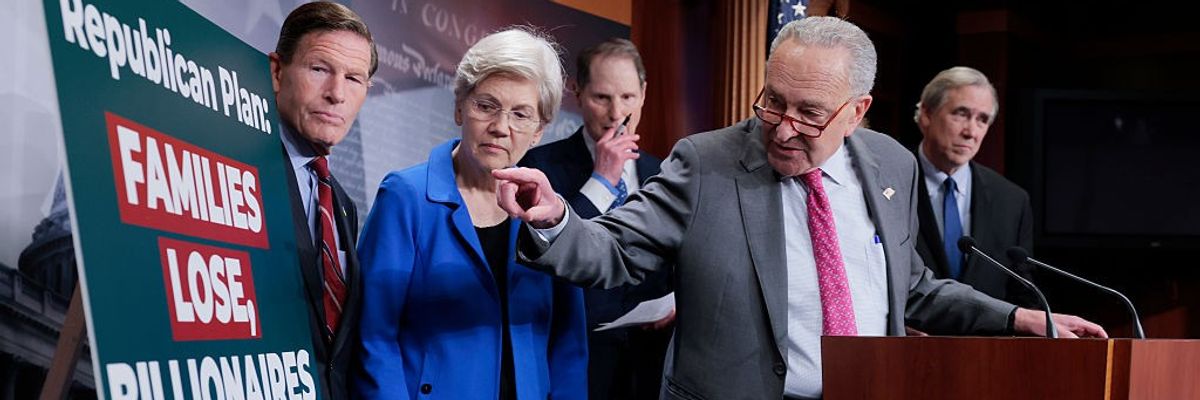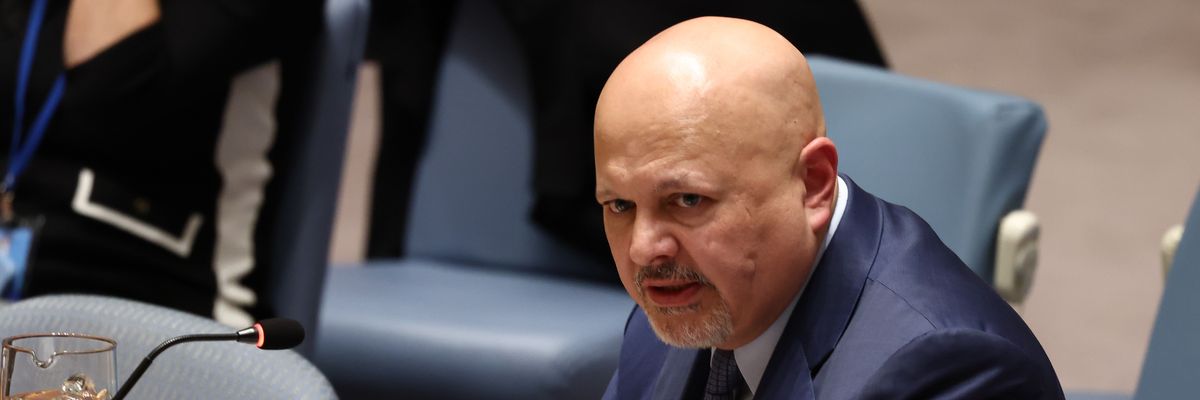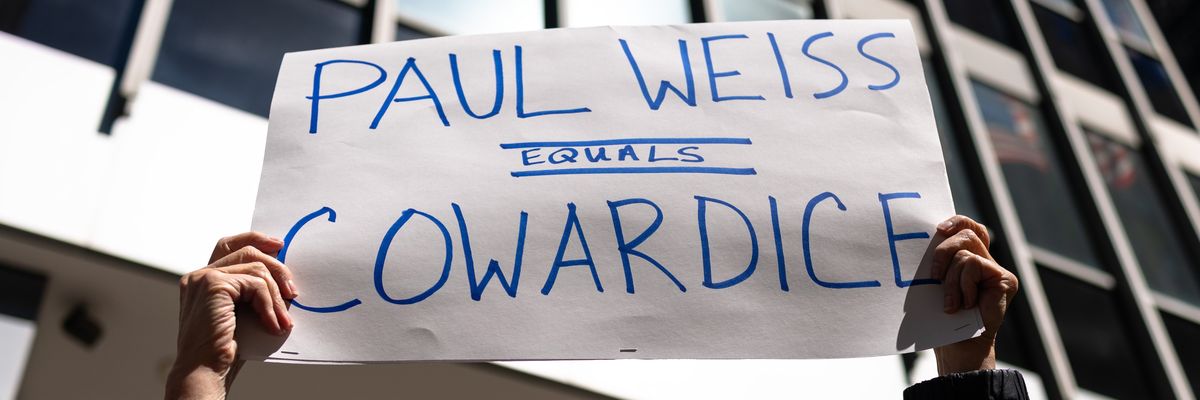'Lawless': Trump DOJ Defies Supreme Court Order for Return of Man Sent to Salvadoran Prison
"I'm not asking for state secrets," said a federal judge as lawyers for the White House refused to provide information about Kilmar Abrego Garcia.
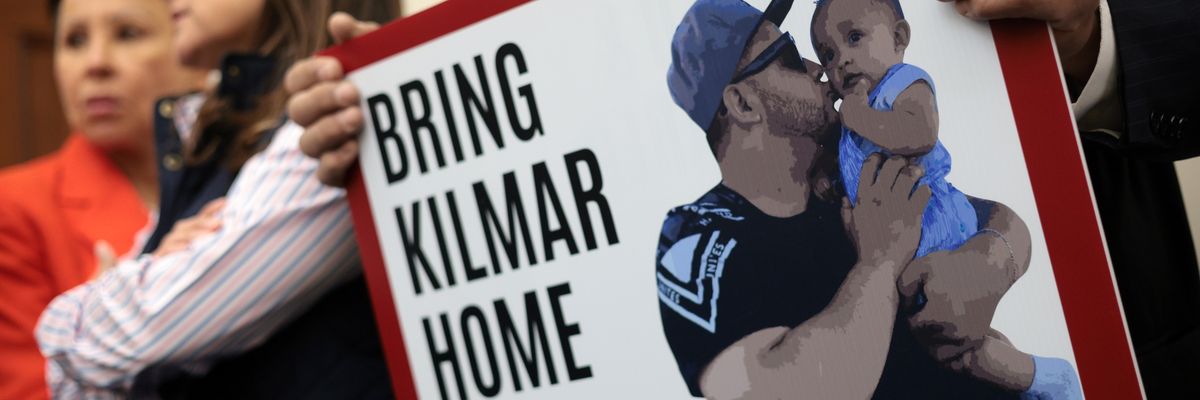
A member of the Congressional Hispanic Caucus holds a picture of Kilmar Abrego Garcia during a news conference to discuss his arrest and expulsion at Cannon House Office Building on April 9, 2025 in Washington, D.C.
(Photo: Alex Wong/Getty Images)
The U.S. Supreme Court's unanimous decision on Thursday was clear: The Trump administration was ordered to "facilitate and effectuate" the release of Kilmar Abrego Garcia, a Maryland resident with no criminal record who was among hundreds of migrants rounded up in recent weeks and sent to an El Salvador prison.
But lawyers for President Donald Trump's Department of Justice (DOJ) on Friday insisted they needed more time to "review" the high court's ruling and refused to provide details on when and how they would ensure Abrego Garcia was returned to his family in Maryland.
Drew Ensign, one attorney representing the Trump administration, argued at a hearing Friday afternoon with U.S. District Judge Paula Xinis in Maryland over the court-ordered requirement that the government "share what it can concerning the steps it has taken" to return Abrego Garcia.
The hearing had been previously scheduled before the Supreme Court handed down its ruling, and went ahead as planned despite the DOJ's request on Friday morning for Xinis to postpone it till next Wednesday.
"Defendants are unable to provide the information requested by the court on the impracticable deadline set by the court hours after the Supreme Court issued its order," wrote the DOJ lawyers in a filing on Friday morning, striking an aggressive tone similar to the one the government displayed in the hearing later.
Immigration attorney Eric Lee said the filing displayed "a lawless government."
Xinis responded to the request by giving the lawyers until 11:30 am—a two-hour extension of the previous deadline—to submit a written declaration of steps the administration is taking for Abrego Garcia, whom they have said was sent to El Salvador due to an "administrative error," claiming that his fate is out of the United States' control.
But she urged the lawyers to keep in mind that the "act of sending Abrego Garcia to El Salvador was wholly illegal from the moment it happened."
At the hearing, she clashed further with Ensign.
The attorney said again that the administration is "not yet prepared to share" more information about Abrego Garcia.
"I'm not asking for state secrets," she replied, demanding "roughly a dozen times," according to The New York Times, that Ensign provide information about the man's exact whereabouts and plans for his return. "Is anyone moving with any kind of speed to get to the bottom of this so I can get an answer?"
Ensign confirmed that the government intends to comply with the Supreme Court's order before the hearing ended after less than half an hour. Xinis ordered the DOJ to provide daily updates about its progress in securing his release.
In a press briefing on Friday, White House press secretary falsely claimed that the Supreme Court ordered the White House only to "facilitate the return, not to effectuate the return" of Abrego Garcia.
The White House and the Republican Party have attacked the judiciary numerous times in recent weeks, with calls to impeach judges who have ruled against Trump's agenda—including U.S. District Judge James Boasberg, who issued a nationwide restraining order against the president's invocation of the Alien Enemies Act to expel suspected gang members to El Salvador.
Homeland Security Adviser Stephen Miller is among the officials who have pushed the idea that federal judges, in demanding that Trump follow constitutional law, are interfering in "foreign affairs."
The Supreme Court included in its ruling a directive for Xinis to proceed with "due regard for the deference owed to the executive branch in the conduct of foreign affairs," leading Miller to suggest that the White House is still under no obligation to return Abrego Garcia.
"If the United States government is paying El Salvador to imprison people on its behalf," said Andrea R. Flores, vice president of FWD.us, "there should be absolutely no 'foreign affairs' reason that they cannot ask their contractor, El Salvador, to return Kilmer Abrego Garcia immediately."
US and El Salvador Guilty of 'Grave' Crimes of Enforced Disappearance, Arbitrary Detention: HRW
"The cruelty of the U.S. and Salvadoran governments has put these people outside the protection of the law and caused immense pain to their families," said one human rights advocate.
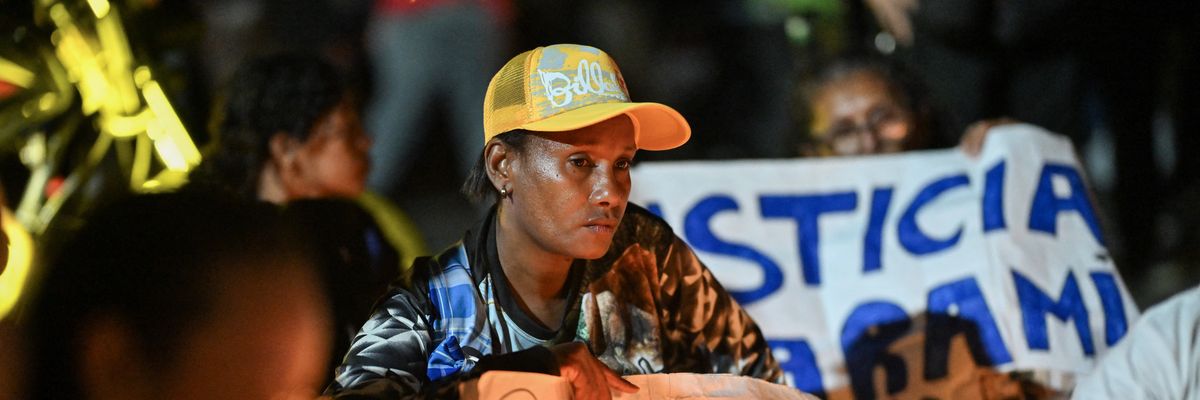
Relatives of Venezuelan migrants deported from the U.S. to a maximum security prison in El Salvador attend a vigil in front of El Salvador embassy in Caracas, Venezuela on April 2, 2025.
(Photo: Juan Barreto / AFP via Getty Images)
Eloise Goldsmith
Apr 11, 2025COMMON DREAMS
Human Rights Watch on Friday accused the governments of the United States and El Salvador of "a grave violation of international human rights law" over the deportation more than 230 Venezuelan nationals by the Trump administration to a megaprison in El Salvador last month.
The actions taken against the deportees constitute both enforced disappearances and arbitrary detention, according to a statement from the group released Friday.
"The cruelty of the U.S. and Salvadoran governments has put these people outside the protection of the law and caused immense pain to their families," said Juanita Goebertus, Americas director at Human Rights Watch.
The group said that since their removal, the Venezuelans "have been held incommunicado" and that the United States and Salvadoran officials have not released a list of the people who were removed, though CBS News last month published a list of names the outlet obtained.
The administration invoked the Alien Enemies Act, a rarely used law that gives the president broad authority to detain or deport non-citizens during times of war, to justify dozens of the deportations—triggering a fierce legal battle.
The Trump administration invoked the Alien Enemies Act in response to an alleged "invasion" by "Tren de Aragua," a Venezuelan gang, but the government has produced scant evidence that the people removed had ties to Tren de Aragua. One hundred and one of the deportees were removed under regular immigration procedures.
According to Human Rights Watch, the Salvadoran government has failed to offer a legal basis for detaining the Venezuelan deportees and has not indicated when or whether they will be released.
"It appears that their detention is wholly arbitrary and potentially indefinite; a grave violation of El Salvador's human rights obligations," the group said.
Enforced disappearance, according to Human Rights Watch, is when officials deprive someone of their liberty and then conceal the fate or whereabouts of the disappeared person. The violation is "especially serious" because it means they are outside the protection of the law.
The group is calling on U.S. authorities to publicly identify the Venezuelans who were removed to El Salvador and is urging the Salvadoran government to "confirm their current whereabouts, disclose whether there is any legal basis for their detention, and allow them contact with the outside world."
The statement from Human Rights Watch also detailed the struggle that family members of the deported individuals have faced getting information about them.
The group has interviewed 40 relatives of people "apparently" removed to El Salvador, and all of them told Human Rights Watch that U.S. immigration authorities initially informed their relatives, who were in U.S. immigration detention, that they would be sent to Venezuela. They were not told they would be sent to El Salvador.
"Nobody should be forced to piece together bits of information from the media or to read into the authorities' silence to find out where their relatives are being held," Goebertus said. "Salvadoran authorities should urgently disclose the names and locations of all detainees transferred from the US, and allow them to contact their families."
In addition to the Venezuelans who were deported in March, the Trump administration also deported a smaller number of Salvadoran nationals. U.S. Immigration and Customs Enforcement has admitted that one of the men sent to El Salvador was deported in "error." On Thursday, the Supreme Court instructed the Trump administration to take steps to retrieve the man it had wrongly deported.
Supreme Court Orders Trump Officials to Return Man Wrongfully Deported to Salvadoran Prison
"This is a massive win for justice and the rule of law," said one Democratic congresswoman. "Now Trump must comply."
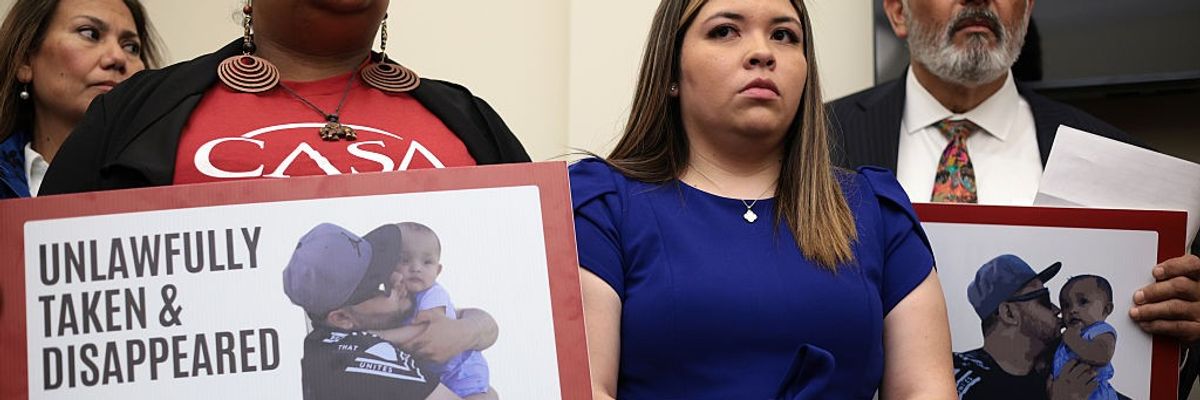
Jennifer Vasquez Sura (in blue dress), the wife of wrongfully deported Venezuelan man Kilmar Abrego García, listens during a news conference with members of the Congressional Hispanic Caucus to discuss his husband's plight on April 9, 2025 in Washington, D.C.
(Photo: Alex Wong/Getty Images)
Brett Wilkins
Apr 10, 2025
COMMON DREAMS
The U.S. Supreme Court on Thursday issued a ruling with no noted dissents affirming a federal judge's order compelling President Donald Trump's administration to enable the stateside return of Kilmar Abrego García, a Salvadoran man wrongfully deported to a notorious prison in his native country.
"The rule of law won today," said Andrew Rossman, one of Abrego García's lawyers. "Time to bring him home."
Justice Sonia Sotomayor wrote in Thursday's unsigned order that the Trump administration must "facilitate and effectuate" Abrego García's release from custody "and to ensure that his case is handled as it would have been had he not been improperly sent to El Salvador."
"The intended scope of the term 'effectuate' in the district court's order is, however, unclear, and may exceed the district court's authority," Sotomayor added. "The district court should clarify its directive, with due regard for the deference owed to the executive branch in the conduct of foreign affairs."
Last week, U.S. District Judge Paula Xinis gave the Trump administration until Monday April 7 to return Abrego García, who was deported last month to the Terrorism Confinement Center (CECOT) super-maximum security prison in central El Salvador after the government claimed without credible evidence that he was a gang member.
"Defendants seized Abrego García without any lawful authority; held him in three separate domestic detention centers without legal basis; failed to present him to any immigration judge or officer; and forcibly transported him to El Salvador in direct contravention" of immigration law, she wrote.
A panel of the 4th U.S. Circuit Court of Appeals declined to stay Xinis' order, with one judge on the tribunal writing, "The United States government has no legal authority to snatch a person who is lawfully present in the United States off the street and remove him from the country without due process."
The panel refuted the Trump administration's assertion that it could not return Abrego García, calling the government's argument "that the federal courts are powerless to intervene... unconscionable."
However, on Monday, Supreme Court Chief Justice John Roberts temporarily blocked Xinis' order just before the midnight deadline pending review by all nine justices.
Abrego García's legal team argued that their client was the victim of a "Kafkaesque mistake." Among the so-called evidence the government used to claim he is a member of the MS-13 criminal gang was a Chicago Bulls hat and hoodie he wore, and a snitch's tip. The Trump administration subsequently admitted in a March 31 court filing that Abrego García's deportation was an "administrative error" and an "oversight."
Before he was deported, Abrego García, 29, lived in Maryland with his wife, Jennifer Stefania Vasquez Sura, a U.S. citizen; their autistic, nonverbal 5-year-old child; and two children from Vasquez Sura's previous relationship. His lawyers said he left El Salvador to escape the then-endemic gang violence there.
Advocates for Abrego García welcomed the high court's order, with Congressman Joaquin Castro (D-Texas) writing on the social media site Bluesky that the justices "did the right thing."
"This is about the rule of law and due process," he added. "Kilmar Abrego García should be reunited with his family."
Rep. Pramila Jayapal (D-Wash.) said: "This is a massive win for justice and the rule of law. Now Trump must comply."







